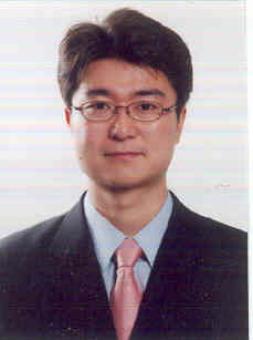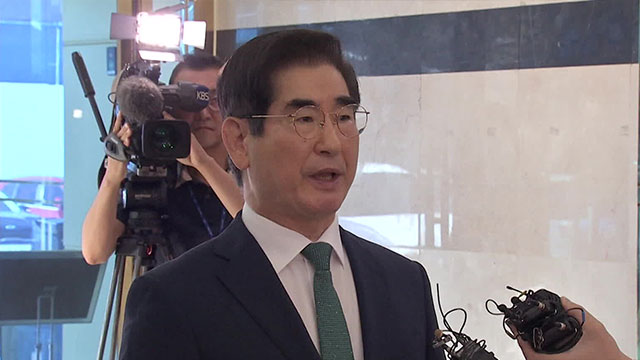[Anchor]
The trade war between the United States and China is escalating tensions.
It has been reported that the U.S. is pushing a policy to restrict the import of American equipment into the Chinese factories of South Korean semiconductor companies.
Amid the U.S.-China conflict, there are concerns that domestic semiconductor companies may be caught in the crossfire, as reported by KBS Washington correspondent Kim Kyung-soo.
[Report]
Since 2022, the U.S. has strictly controlled the export of advanced semiconductor equipment to China.
[Joe Biden/Former U.S. President/Oct. 2022: "We’re going to make sure that companies that take these taxpayers’ dollars do not turn around and make investments in China — investments that undermine our supply chains and national security."]
However, for semiconductor companies in South Korea and Taiwan, the U.S. government has recognized them as VEU (Validated End User) after prior verification and granted comprehensive export approvals to China.
However, under the Trump administration, it has become difficult to receive such benefits.
The Wall Street Journal reported that the U.S. Department of Commerce's export control chief notified Samsung Electronics, SK hynix, and TSMC last week about the abolition of the VEU system and the policy to restrict the import of equipment into Chinese factories.
White House officials stated that this is similar to China's policy of controlling rare earth exports to the U.S. and applying a permit system.
This is interpreted as an intention to weaponize semiconductor resources like China's rare earths.
[Pete Hegseth/U.S. Secretary of Defense/May 2025: "Economic dependence on China only deepens their malign influence and complicates our defense decision space during times of tension."]
According to the new policy, Samsung Electronics and SK hynix, which are operating semiconductor factories in China, will inevitably face setbacks.
Industry insiders expressed concerns that if the restrictions on American equipment are prolonged and the import of parts becomes difficult, production disruptions may occur.
However, the Wall Street Journal reported that the U.S. Department of Commerce has not finalized the policy as it has not obtained consent from other departments, including the Department of Defense.
This suggests that there is still room for negotiation.
Reporting from Washington, this is KBS News Kim Kyung-soo.
The trade war between the United States and China is escalating tensions.
It has been reported that the U.S. is pushing a policy to restrict the import of American equipment into the Chinese factories of South Korean semiconductor companies.
Amid the U.S.-China conflict, there are concerns that domestic semiconductor companies may be caught in the crossfire, as reported by KBS Washington correspondent Kim Kyung-soo.
[Report]
Since 2022, the U.S. has strictly controlled the export of advanced semiconductor equipment to China.
[Joe Biden/Former U.S. President/Oct. 2022: "We’re going to make sure that companies that take these taxpayers’ dollars do not turn around and make investments in China — investments that undermine our supply chains and national security."]
However, for semiconductor companies in South Korea and Taiwan, the U.S. government has recognized them as VEU (Validated End User) after prior verification and granted comprehensive export approvals to China.
However, under the Trump administration, it has become difficult to receive such benefits.
The Wall Street Journal reported that the U.S. Department of Commerce's export control chief notified Samsung Electronics, SK hynix, and TSMC last week about the abolition of the VEU system and the policy to restrict the import of equipment into Chinese factories.
White House officials stated that this is similar to China's policy of controlling rare earth exports to the U.S. and applying a permit system.
This is interpreted as an intention to weaponize semiconductor resources like China's rare earths.
[Pete Hegseth/U.S. Secretary of Defense/May 2025: "Economic dependence on China only deepens their malign influence and complicates our defense decision space during times of tension."]
According to the new policy, Samsung Electronics and SK hynix, which are operating semiconductor factories in China, will inevitably face setbacks.
Industry insiders expressed concerns that if the restrictions on American equipment are prolonged and the import of parts becomes difficult, production disruptions may occur.
However, the Wall Street Journal reported that the U.S. Department of Commerce has not finalized the policy as it has not obtained consent from other departments, including the Department of Defense.
This suggests that there is still room for negotiation.
Reporting from Washington, this is KBS News Kim Kyung-soo.
■ 제보하기
▷ 카카오톡 : 'KBS제보' 검색, 채널 추가
▷ 전화 : 02-781-1234, 4444
▷ 이메일 : kbs1234@kbs.co.kr
▷ 유튜브, 네이버, 카카오에서도 KBS뉴스를 구독해주세요!
- U.S. may curb chip gear
-
- 입력 2025-06-21 23:21:19

[Anchor]
The trade war between the United States and China is escalating tensions.
It has been reported that the U.S. is pushing a policy to restrict the import of American equipment into the Chinese factories of South Korean semiconductor companies.
Amid the U.S.-China conflict, there are concerns that domestic semiconductor companies may be caught in the crossfire, as reported by KBS Washington correspondent Kim Kyung-soo.
[Report]
Since 2022, the U.S. has strictly controlled the export of advanced semiconductor equipment to China.
[Joe Biden/Former U.S. President/Oct. 2022: "We’re going to make sure that companies that take these taxpayers’ dollars do not turn around and make investments in China — investments that undermine our supply chains and national security."]
However, for semiconductor companies in South Korea and Taiwan, the U.S. government has recognized them as VEU (Validated End User) after prior verification and granted comprehensive export approvals to China.
However, under the Trump administration, it has become difficult to receive such benefits.
The Wall Street Journal reported that the U.S. Department of Commerce's export control chief notified Samsung Electronics, SK hynix, and TSMC last week about the abolition of the VEU system and the policy to restrict the import of equipment into Chinese factories.
White House officials stated that this is similar to China's policy of controlling rare earth exports to the U.S. and applying a permit system.
This is interpreted as an intention to weaponize semiconductor resources like China's rare earths.
[Pete Hegseth/U.S. Secretary of Defense/May 2025: "Economic dependence on China only deepens their malign influence and complicates our defense decision space during times of tension."]
According to the new policy, Samsung Electronics and SK hynix, which are operating semiconductor factories in China, will inevitably face setbacks.
Industry insiders expressed concerns that if the restrictions on American equipment are prolonged and the import of parts becomes difficult, production disruptions may occur.
However, the Wall Street Journal reported that the U.S. Department of Commerce has not finalized the policy as it has not obtained consent from other departments, including the Department of Defense.
This suggests that there is still room for negotiation.
Reporting from Washington, this is KBS News Kim Kyung-soo.
The trade war between the United States and China is escalating tensions.
It has been reported that the U.S. is pushing a policy to restrict the import of American equipment into the Chinese factories of South Korean semiconductor companies.
Amid the U.S.-China conflict, there are concerns that domestic semiconductor companies may be caught in the crossfire, as reported by KBS Washington correspondent Kim Kyung-soo.
[Report]
Since 2022, the U.S. has strictly controlled the export of advanced semiconductor equipment to China.
[Joe Biden/Former U.S. President/Oct. 2022: "We’re going to make sure that companies that take these taxpayers’ dollars do not turn around and make investments in China — investments that undermine our supply chains and national security."]
However, for semiconductor companies in South Korea and Taiwan, the U.S. government has recognized them as VEU (Validated End User) after prior verification and granted comprehensive export approvals to China.
However, under the Trump administration, it has become difficult to receive such benefits.
The Wall Street Journal reported that the U.S. Department of Commerce's export control chief notified Samsung Electronics, SK hynix, and TSMC last week about the abolition of the VEU system and the policy to restrict the import of equipment into Chinese factories.
White House officials stated that this is similar to China's policy of controlling rare earth exports to the U.S. and applying a permit system.
This is interpreted as an intention to weaponize semiconductor resources like China's rare earths.
[Pete Hegseth/U.S. Secretary of Defense/May 2025: "Economic dependence on China only deepens their malign influence and complicates our defense decision space during times of tension."]
According to the new policy, Samsung Electronics and SK hynix, which are operating semiconductor factories in China, will inevitably face setbacks.
Industry insiders expressed concerns that if the restrictions on American equipment are prolonged and the import of parts becomes difficult, production disruptions may occur.
However, the Wall Street Journal reported that the U.S. Department of Commerce has not finalized the policy as it has not obtained consent from other departments, including the Department of Defense.
This suggests that there is still room for negotiation.
Reporting from Washington, this is KBS News Kim Kyung-soo.
-
-

김경수 기자 bada@kbs.co.kr
김경수 기자의 기사 모음
-
이 기사가 좋으셨다면
-
좋아요
0
-
응원해요
0
-
후속 원해요
0















이 기사에 대한 의견을 남겨주세요.